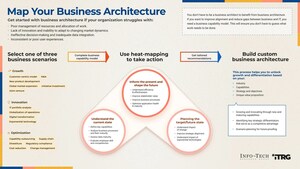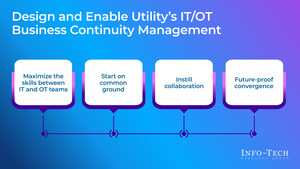
TORONTO, April 8, 2022 /PRNewswire/ - Global IT research and advisory firm Info-Tech Research Group has highlighted the key changes in Microsoft's new agreement type, the new commerce experience (NCE). Through expert analysis, the firm explains how this will impact licensing renewals and shift the landscape of how Microsoft will do business moving forward. Understanding these changes will be essential for organizations to negotiate upcoming renewals effectively.
"Customers renewing agreements with Microsoft will want to take the appropriate time and do the necessary due diligence to ensure there are no surprises waiting for them in their deals," says Research Director Aadil Nanji. "Microsoft will continue to institute changes like these. To be able to negotiate from a position of strength, customers must know what cards Microsoft is holding."
Info-Tech states that organizations with fewer than 2,400 licenses and those that require month-to-month flexibility will likely be migrated to this model. Along with pricing increases on its cloud subscription products, Microsoft has made changes to its Unified Support commercial terms.
New Commerce Experience
In late 2021, Microsoft unveiled the new commerce experience (NCE) as a successor to the Cloud Solution Provider (CSP) program. The general availability of the NCE started in January 2022, with promotions available to customers when migrating over from a CSP agreement.
The CSP channel was primarily used by customers for the flexibility it provided. For licenses purchased on a month-to-month basis, the CSP allowed customers to change quantities easily. Additionally, the CSP was the channel that customers were pushed toward since the shift in minimum quantities on the Enterprise Agreement (EA) changed from 250 to 500 licenses.
"With the NCE agreement, Microsoft's aim was to standardize purchasing transactions with Azure, which they later extended outward to Office 365, Microsoft 365, Dynamics 365, Windows 365, and Power Platform transactions," adds Nanji.
There are three core differences between the CSP and NCE:
- Microsoft charges a 20% premium if a month-to-month agreement is desired in NCE.
- NCE reduces flexibility for midterm true-down.
- NCE agreements provide the ability to go from a one-year-only agreement to a three-year option.
Additional differences are listed in the table below:
Change |
CSP |
NCE |
Billing |
Monthly, Annual |
Monthly, Annual, 3 years |
Cancellation policy |
30 days |
72 hours |
Full refund and prorated |
Within 30 days |
Within 24 hours |
Pricing |
No price premium for month-to-month |
+20% price premium for month-to-month, same as CSP |
Commitment |
Month-to-month flexibility |
Firm for term |
Cancellation |
Cancellation after 72 hours will be billed for |
Cancellation after 72 hours will be billed for the full 12- or |
Price lock |
1 month |
1 or 3 years |
Midterm upgrades |
Allowed |
Allowed |
Midterm downgrades |
Allowed |
Not allowed |
Product availability |
All Per-User SKUs upon general availability |
All Per-User SKUs (except Windows 365) upon general |
"Microsoft may allow customers who are currently on a CSP agreement one final renewal term before migrating them over to the NCE agreement," explains Nanji. "This final renewal will be beneficial, as it will preserve month-to-month flexibility for organizations who require it. Customers who have already signed the overarching Microsoft Customer Agreement (MCA) will not have to sign it again to purchase through the NCE. However, similar to a CSP, an MCA agreement will be required to purchase from an NCE."
Pricing Increases
In September 2021, Microsoft announced pricing increases that would affect the productivity suite subscription products. These increases went into effect on March 1, 2022 and apply globally. The table below lists the old and new pricing.
Product |
Old MSRP (US$) |
New MSRP (US$) |
Microsoft 365 Business Basic |
$5 |
$6 |
Microsoft 365 Business Premium |
$20 |
$23 |
Office 365 E1 |
$8 |
$10 |
Office 365 E3 |
$20 |
$23 |
Office 365 E5 |
$35 |
$38 |
Microsoft 365 E3 |
$32 |
$36 |
"Microsoft has attributed the price changes to the addition of various applications and features, focusing in particular on security features such as email encryption, data loss prevention, and compliance requirements for eDiscovery and core litigation hold," states Nanji. "Additionally, Teams improvements and the addition of audioconferencing capabilities to all E3 SKUs contribute to the price increases."
The current recourse for customers to combat these price increases is to seek additional discounts. However, Microsoft has tied a product portfolio mix to any additional discounting. The desired product mix would include Azure, Dynamics, Power Platform, and E5 Security bundles.
Unified Support
"Microsoft has implemented an array of changes related to Unified Support that will have a significant impact on deals negotiated," explains Nanji. "Some of those changes relate to the services or levels of support offered and how these costs are calculated."
When signing a new deal or renewing, Info-Tech recommends that organizations examine the following key points:
- Beware of hyperlinks with information that could change at Microsoft's will.
- Ensure detailed information of the previous term's usage is provided.
- A new offering has been introduced called Unified Enterprise, which is separate from the Advanced and Performance support tiers. Unified Enterprise has redefined severity and response time levels.
- Multi-year deals are now available.
- Ask Microsoft to provide detailed breakdowns of any pricing provided.
- Discounts can be negotiated but are dependent on deal structure characteristics.
"The most impactful change Microsoft has made relates to repricing a Unified Support Agreement," shares Nanji. "In agreements that Info-Tech has reviewed, we've seen that Microsoft has begun including a clause within the Unified Support statement of work stating that, should the organization's Enterprise Agreement spend change by 5% or more than the preceding annual period, Microsoft can reprice the correlated Unified Support Agreement. This could cause many organizations heartburn throughout their agreements and unexpected spend. We at Info-Tech recommend that customers ask Microsoft to strike out that language."
Info-Tech adds that organizations considering purchasing additional Microsoft services, such as an E5, can experience significant and unexpected cost increases. Organizations that are growing or have merger activity are also at greater risk. The best course of action for customers is to negotiate with Microsoft to strike this clause since it has only recently been included in Unified Support Agreements.
"With the magnitude of the aforementioned cost impacts, a growing proportion of organizations are looking toward third-party Microsoft support," says Nanji. "Depending on the criticality of systems being supported, this may be a viable solution to reduce support fees by close to 50%."
Customers renewing agreements with Microsoft will want to take the appropriate time and do the necessary due diligence to ensure there are no surprises waiting for them in their deals.
"Microsoft will continue to institute changes like these, and to be able to negotiate from a position of strength customers must know what cards Microsoft is holding. A trusted partner like Info-Tech can aid in this process by reviewing and assessing inherent risks within Microsoft agreements and providing recommendations based on industry knowledge and deals seen daily.
To learn more on how to take control of Microsoft licensing, download and read Info-Tech's complete Modernize Your Microsoft Licensing for the Cloud Era blueprint.
To learn more about Info-Tech Research Group and to download all the latest research, visit www.infotech.com and connect via LinkedIn, Twitter, and Facebook.
Media professionals are encouraged to register for Info-Tech's Media Insiders program for more research and insights. This program provides unrestricted, on-demand access to IT, HR, and software industry content and subject matter experts from a group of more than 200 research analysts. To apply for access, contact [email protected].
About Info-Tech Research Group
Info-Tech Research Group is one of the world's leading information technology research and advisory firms, proudly serving over 30,000 IT professionals. The company produces unbiased and highly relevant research to help CIOs and IT leaders make strategic, timely, and well-informed decisions. For 25 years, Info-Tech has partnered closely with IT teams to provide them with everything they need, from actionable tools to analyst guidance, ensuring they deliver measurable results for their organizations.
SOURCE Info-Tech Research Group







Share this article